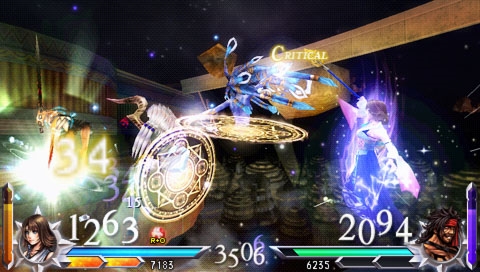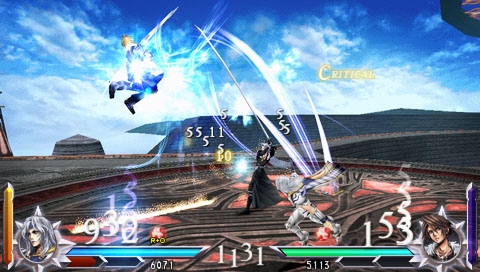
Square Enix Monster-Artist-turned-Character-Designer-turned-Game-Director Tetsuya Nomura has had his hands full, pioneering established series while creating new ones along the way. Since working as a key member of the main Final Fantasy team, he’s gone on to birth the successful Kingdom Hearts series, directed the film Final Fantasy VII: Advent Children, delivered The World Ends With You on the DS, and is currently at the helm of the highly-anticipated PS3 exclusive, Final Fantasy Versus XIII. With a workload that would make most developers have a nervous breakdown, he’s somehow managed to create another Final Fantasy spin-off with the Dissidia series. Dissidia 012 [Duodecim] Final Fantasy aims to amp up the fighting game foundations of the first game while providing even better fan-service with all the Final Fantasy protagonists and antagonists you love. Duodecim is a strong title from Square Enix, but it’s not as substantive as some of their other portable titles.
Platform: PSP
Publisher: Square Enix
Developer: Square Enix, 1st Production Department
Genre: Super Smash Bros. Gaea
Release Date: March 22, 2011
ESRB Rating: Teen
Dissidia 012 is a 3D fighting game that moonlights as an action RPG. The game brings together the primary heroes and villains from the thirteen main Final Fantasy titles and pits them against each other to settle an age-old dispute between Cosmos, the god of harmony, and Chaos, the god of discord. This sequel adds six new fighters to the mix: Lightning, Vaan Ratsbane, Laguna Loire, Yuna, Tifa Lockheart, and Kain Highwind. Whereas in the first game’s story mode you played as each of the ten protagonists in any order you liked, Duodecim brings in a linear progression of chapters, throughout which you play as each of the new additions. The flow isn’t as predictable as each character having one episode, though. Some of them come back to star in later chapters and they all to come together for the finale.
The underlying concept of the game, the ultimate Final Fantasy mash-up, is both its primary strength and its greatest weakness. I’ve played through the main series, except for the MMOs XI and XIV, multiple times a piece, and honestly love every game and its cast. It won’t complete my life, but I can sympathize with fans who want to see Kain show the mama’s boy Sephiroth how they did things back in the ol’ days. While the game can be a tour de force of the sights and sounds that have made this series resonate so strongly with gamers, and indeed treats them to a few inside jokes, it can be hard to appreciate what’s actually here on top of it.
For any Final Fantasy fan, Duodecim can be an absolutely fantastic experience. The memorable scores from all of the games are here, and the way they’ve been arranged, or not arranged, is a source of celebration. Hearing Final Fantasy III’s battle theme slowed down into a drum-heavy tune makes any battle more exciting once the familiar notes start kicking in. On the other hand, Final Fantasy VII’s “Let the Battles Begin!” sounds almost the same as it did in the original game, which, while playing as Tifa, really takes you back to the magical era some like to call 1997. The music does more than set the tone, though, as the use of certain songs evoke strong memories, especially if they’re associated with a certain event or character arc from the original game. The greatest example is how Eyes on Me plays as Laguna’s overworld theme, which is a very heartbreaking thing if you’ve played through Final Fantasy VIII and know the significance that the song has to the story.

But remembering these powerful moments only begs the question: what the hell are these characters doing here? The fact that these heroes are “taken” from their own worlds with their memories shattered suggests that Dissidia is meant to be canonical. If that’s the case, hasn’t each individual Final Fantasy been a kind of battle between harmony and discord on its own, if not between Cosmos and Chaos themselves? Every character in this game has been affected by the life-changing events of that struggle. For them to be pulled out of their settings and fight again in that same conflict on another world seems cruelly redundant. All of the FF heroes since Cecil have had dramatic arcs that are, in many cases, emotionally devastating. It almost feels unfair to take these characters who you’ve already been through so much with and force them to fight again. In many ways, it’s almost disrespectful to the fans of the series.
The one disappointment that definitely made my jaw drop is that Cloud Strife from FFVII has actually been redesigned again. So if we count the original game, Kingdom Hearts, Advent Children, and now this, we’re currently on the third re-design of Cloud. Didn’t they take his character far enough when they were giving him red scarves for his neck and superfluous bandages for his sword? To make matters worse, they continue his Advent Children wandering of shame by making him the same brooding, unhappy character from that movie. His only appearance in the story is in the reports, but to see Cloud still feel so devastated and guilty over Aeris’ death is, again, borderline disrespectful to the fans. You cross the line from fan-service to milking when you exploit the most recognizable conflicts from a story, instead of building on top of their resolution. You can almost say Square has made Cloud a reflection of his own fanboys: pathetically unable to get over Aeris’ death, going on 14 years since it happened (Disclaimer: FFVII and Cloud are my favorite game and protagonist of the series, respectively). Cloud’s appearance, while generally awesome, is really a microcosm of how Duodecim’s story takes you through the motions of bliss and rage, until it takes a break and lets you indulge in its gameplay.
Overall, Duodecim’s fighting experience is pretty fun. Each part of the story has you entering a gate, which brings you to a cave-like game board where you initiate fights with opponents blocking your way to get to the end, or go after ones off the beaten path in order to grab chests (or just for the XP). In the one-on-one battles that ensue, you beat your opponents by first using Bravery attacks to build up your Bravery points and diminish your opponent’s. Then, you cash them in and convert that number to actual HP damage by using HP attacks. Every character’s playing style is quite different, especially among the six new characters. The combat takes place in a highly stylized form, as you run up walls, grind across edges, and dash towards your opponents. It’s a lot like “Dragon Ball Z”, which begs yet another “why the hell” question, although it’s fun enough for us to not go down that path.
The game has added a few new additions to the original Dissidia formula. You can now bring assist characters along for the ride, who fill up their own bar throughout the fight like Marvel vs. Capcom. You also traverse a world map in between battles, which breaks up the monotony of the cave boards by adding in a sense of exploration, even if that sense is somewhat false. One of the most value-adding features is that the entire first game is unlocked after completing the story, augmented with all the new features Duodecim has to offer.

The battle system does have its downsides. The difficulty is puzzlingly easy at first, and almost 90% of the battles are mere stepping stones to reach the real bosses. When most of the fights are made to be beaten with little to no skill required, you have to question the merit of the game you’re playing. Even when you do get into challenging battles, they tend to involve cheap tricks like special summons that cut your Bravery points, boosting theirs. While the ease of the smaller battles gets you wondering, the cheap buffs to the bosses asks if the game system can actually pose a clean, fair challenge to the player. If this game didn’t have multiplayer, I would probably defer to the negative.
Another real downer is the fact that this game really shows the limits of the original PSP’s practicality as a gaming controller. My hands typically hurt after a good session on the non-Go variants, and Dissidia really pushes that. The trigger and face button combinations required for dodging and dashing, as well as the button mashing for some special attacks and blocks, have you doing some seriously awkward hand movements, and it’s not uncommon to hit the Home button or, worse, flick up the power slide and put the system into sleep mode in the middle of a fight. I don’t have these problems playing games with similar control schemes on the PSP Go, but I wouldn’t be surprised if the handling was just as gruesome.
Speaking of Sony’s storage-divergent models, not having extra space to install the game can be absolutely brutal. I played the game with a small Memory Stick, only for keeping game saves on, and the load times are atrocious. I’ve heard installing the game makes them almost passable, but having just beat Tactics Ogre with no load time issues, I’m fairly disappointed by Square Enix. I usually don’t have too many gripes about load times, but for a game where the battles can last fifteen seconds or less, it makes no sense to spend what feels like a full minute getting in and out of that battle. Still worse is the fact that getting into the in-game menu recalls shades of Final Fantasy VI from Anthologies, because even that mundane task can take you several mind-boggling seconds. Equipment changing, item checking, and inventory sorting are some of the hallmarks of Final Fantasy. There’s something seriously wrong when that’s an endeavor you simply don’t want to undertake.
All in all, Duodecim takes you for a wonderful ride with its impressive visuals and powerful music, both of which are borrowed from some of the finest titles produced in gaming. The game’s far from beyond criticism, but it ends up providing a fun way to keep these characters alive, or at the very least, an exceptional portable experience. If this game had the same story and gameplay with different characters, I don’t know if it would stand on its own that well. For better or for worse, this is a game grounded on its novel concept, one which it executes rather well in a portable format.

Review Disclosure: A review copy of Dissidia 012: Final Fantasy was provided by Square Enix for the purposes of this review.







